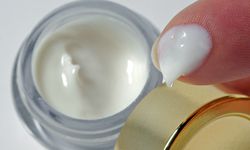Sometimes, the products that you hope improve skin may actually be making it worse. If you're breaking out more often or your skin is appearing red and irritated, your moisturizer could be to blame, even if your skin isn't typically sensitive. It could be that your skin's allergic to the ingredients in a new face cream you're experimenting with, or, your skin could develop an allergy to a tried-and-true product you've been using daily for years. [source: Medicenet.com]
Histamines are chemicals in your cells that trigger an immune response in the form of anything from a runny nose to rosacea. If you have an allergic reaction to a product, it could be due to fragrances or ingredients that increase histamine and cause inflammation.
Advertisement
The allergic reaction from your product could be "irritant contact dermatitis" or an "allergic contact dermatitis." Irritant contact dermatitis is more common and is often the result of a harsh ingredient damaging the skin. It looks like patches of scaly skin or a rash but can develop into blisters if not treated or if you're scratching at it often. Symptoms of allergic contact dermatitis can include itchiness, redness, and swelling of the skin and is the result of an allergic reaction to a specific ingredient. [source: Medicinenet.com]
If you've discovered that your skin breaks out, has a rash, or looks or feels irritated after using your moisturizer, familiarize yourself with the product's ingredient label. Lanolin, for example, is a common active ingredient in these products (such as Eucerin and Lubriderm) as well as a common cause of this type of allergic reaction. [Source: About.com]
Other ingredients frequently used in cosmetics that can cause allergic reactions are perfumes and preservatives. [source: About.com] Keep in mind that the products you've cut out of your diet due to allergic reactions can also be found in face creams and moisturizers as well. If you suffer from a soy allergy, avoid face creams and cosmetics that boast "active soy" ingredients. [source: WebMD.com]
If you're experiencing a reaction, stop using all of your cosmetics to give your skin a break and time to heal. (We know, it can be scary to go makeup-free for days!) Once symptoms have disappeared, slowly introduce your products back one at a time so you can figure out which one is causing the skin problems. If symptoms don't go away after you stop using all products, or you still can't identify the root of the irritation or allergic reaction, see your doctor or dermatologist for help.
It's rare that facial creams can create 'contact urticaria' (hives), says Mona Gohara, MD, associate clinical professor, Yale School of Medicine, Department of Dermatology. "Overall, it is best to stick with mild, hypoallergenic products. Always try a little bit on your inner arm before putting it on your face—this way if you have a reaction, it will be confined and not in an obvious place."
Bottom line: Chat with your dermatologist about the products you've been using and your skin's reaction. Ask them for gentler recommendations for your skin type.
For more information, learn about the Top 5 Allergens In Moisturizers.
Advertisement
